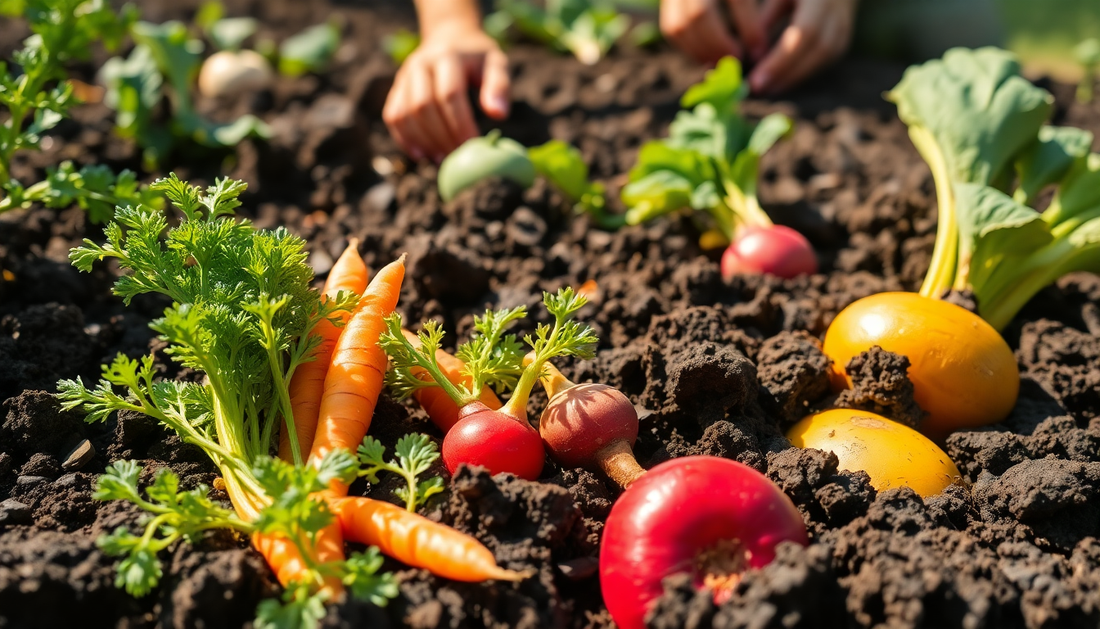
The Perfect Potting Mix for Thriving Root Vegetables
Share
As a passionate gardener, I've learned that the key to growing healthy, bountiful root vegetables lies in the quality of the soil. Whether you're cultivating carrots, beets, radishes, or potatoes, the right potting mix can make all the difference in their growth and flavor. In this comprehensive guide, I'll share my secrets for creating the perfect, nutrient-dense soil blend that will have your root veggies thriving.
Understanding the Needs of Root Vegetables
Root vegetables, such as carrots, beets, and radishes, have unique soil requirements compared to other garden plants. These crops need a lightweight, well-draining medium that allows their roots to expand and develop without resistance. They also thrive in a slightly acidic environment, with a pH range between 6.0 and 6.8.
Additionally, root vegetables require a soil that is rich in organic matter and essential nutrients, including nitrogen, phosphorus, and potassium. These nutrients not only support the growth of the roots but also contribute to the overall flavor and quality of the produce.
Crafting the Perfect Potting Mix
To create the ideal potting mix for your root vegetables, you'll need to combine several key ingredients. Here's a step-by-step guide:
Compost: The Foundation of Nutrient-Rich Soil
The foundation of any great potting mix is high-quality compost. Compost provides a wealth of organic matter, which helps to improve soil structure, water-holding capacity, and nutrient availability. When selecting a compost, look for one that is well-aged and free of any contaminants or weed seeds.
Perlite or Vermiculite: Improving Drainage and Aeration
To ensure your root vegetables have the necessary drainage and air circulation, you'll need to incorporate a lightweight, porous material into your potting mix. Perlite and vermiculite are two excellent options, as they help to create a loose, crumbly texture that allows roots to spread freely.
Peat Moss or Coco Coir: Retaining Moisture
While good drainage is crucial, root vegetables also require consistent moisture to thrive. Peat moss or coco coir can be added to your potting mix to help retain water and prevent the soil from drying out too quickly.
Slow-Release Fertilizer: Steady Nutrient Supply
To provide a steady supply of essential nutrients, consider adding a slow-release organic fertilizer to your potting mix. This will ensure your root vegetables have access to the nourishment they need throughout the growing season, without the risk of burning their delicate roots.
Dolomitic Lime: Adjusting pH Levels
As mentioned earlier, root vegetables prefer a slightly acidic soil environment. To achieve the optimal pH range, you can incorporate a small amount of dolomitic lime into your potting mix. This will help to neutralize any excess acidity and create the perfect growing conditions for your root crops.
Putting It All Together
Here's a sample recipe for a nutrient-rich, well-draining potting mix that's perfect for growing root vegetables:
- 40% high-quality compost
- 30% perlite or vermiculite
- 20% peat moss or coco coir
- 10% slow-release organic fertilizer
- 1-2 cups of dolomitic lime per cubic foot of mix
To create the mix, simply combine all the ingredients in a large container or on a clean surface, and mix them thoroughly until the blend is uniform. Be sure to adjust the ratios as needed to achieve the desired texture and nutrient balance.
Planting and Maintaining Your Root Vegetables
Once you've prepared your custom potting mix, it's time to get planting! Fill your containers or raised beds with the mix, leaving enough room at the top for your root vegetable seeds or seedlings. Plant according to the specific instructions for each crop, and be sure to water the soil thoroughly after planting.
Throughout the growing season, continue to monitor the moisture levels in your potting mix, and water as needed to keep the soil consistently moist but not waterlogged. You may also want to top-dress your plants with a bit of additional compost or fertilizer every few weeks to replenish the nutrients.
With the right potting mix and proper care, your root vegetables will thrive, producing bountiful harvests of delicious, nutrient-dense produce. Enjoy the fruits of your labor, and savor the satisfaction of growing your own healthy, homegrown root crops.
Conclusion
Creating the perfect potting mix for root vegetables may take a bit of effort, but the rewards are well worth it. By incorporating the right blend of compost, perlite or vermiculite, peat moss or coco coir, slow-release fertilizer, and dolomitic lime, you'll be able to provide your root crops with the ideal growing conditions they need to reach their full potential.
Remember, the key to success is understanding the unique soil requirements of root vegetables and tailoring your potting mix accordingly. With a little bit of practice and experimentation, you'll be on your way to growing the most flavorful, nutrient-dense root veggies you've ever tasted.
Happy gardening!
